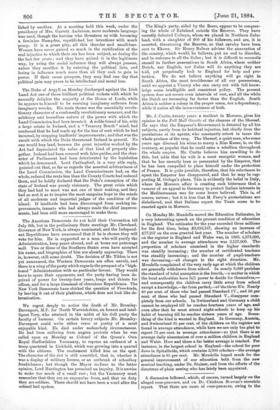The Duke of Argyll on Monday discharged against the Irish
Land Act one of those brilliant political rockets with which he annually delights the majority of the House of Lords, while he appears to himself to be rescuing imaginary sufferers from imaginary wrecks. His main theme was the essentially revolu- tionary character of a confessedly revolutionary measure, and the arbitrary and boundless nature of the power with which the Land Commission had been invested. A noble friend of his, with a large estate in Ireland, and a " Treasury Bench " mind, had confessed that he had made up for the loss of rent which he had incurred, by stopping landlords' improvements ; and that was the result with which the Duke threatened Ireland in general. No one would buy land, because the great injustice worked by the Act had depreciated the value of that kind of property alto- gether. Ireland had been covered with false guides, and the char- acter of Parliament had been deteriorated by the legislation which he denounced. Lord Carlingford, in a very able reply, pointed out that, so far as regards the asserted arbitrariness of the Land Commission, the Land Commissioners had, on the whole, reduced the rents less than the County Courts had reduced them, and he boldly declared that the Duke's conception of the state of Ireland was purely visionary. The great crisis which they had had to meet was not one of their making, and they had so met it as to inspire the most sanguine hope in the minds of all moderate and impartial judges of the condition of the island. If landlords had been discouraged from making im- provements, tenants who had always made the chief improve- ments, had been still more encouraged to make them.


































 Previous page
Previous page